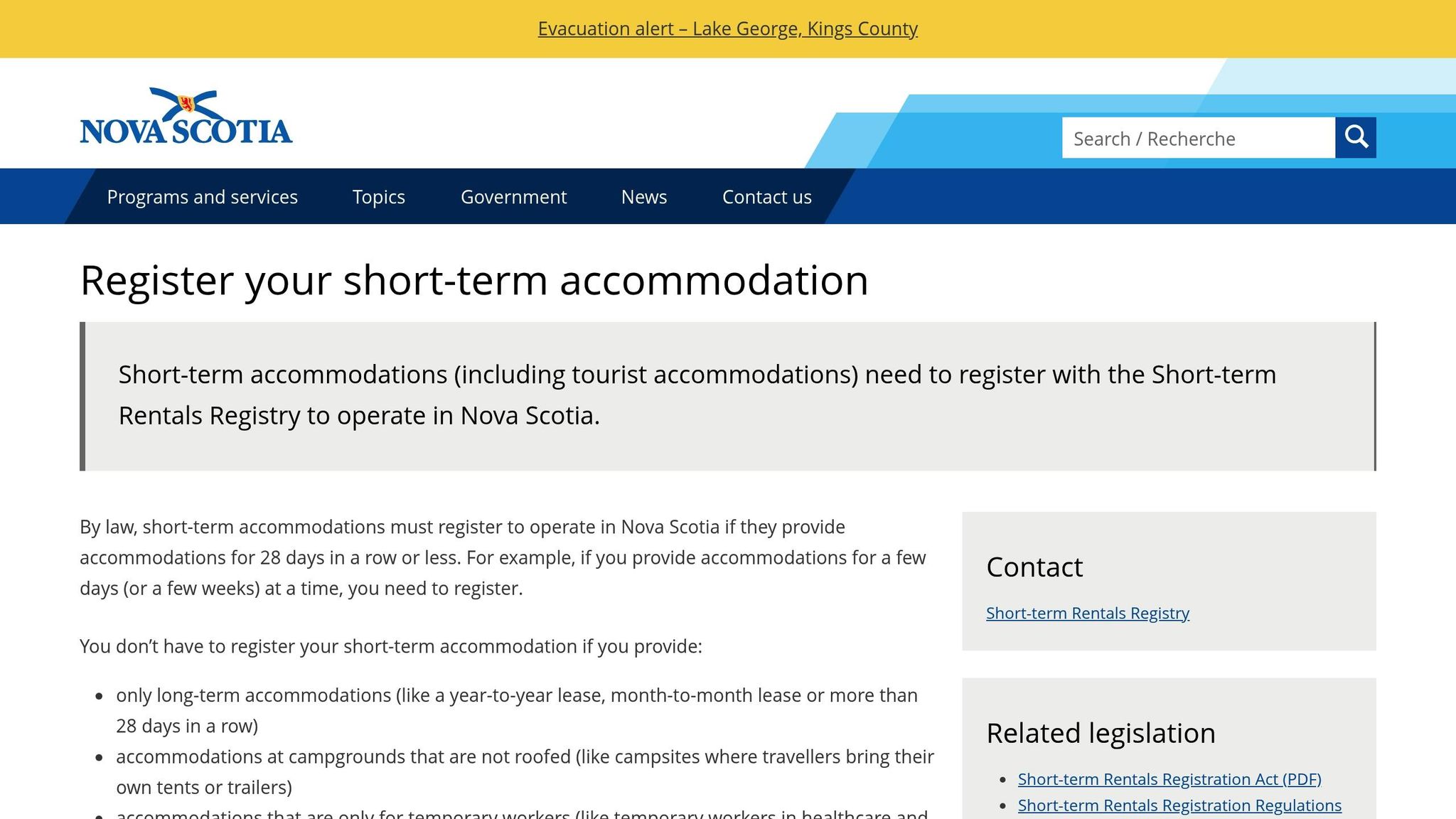The Short-Term Rentals Registration Act (STRRA) in Nova Scotia requires all short-term rental hosts to register their properties, pay fees, and comply with annual renewals. This law aims to address housing shortages and ensure fair competition in the rental market. Non-compliance can lead to fines or shutdowns. Key points include:
- Who needs to register: All short-term rental hosts, including those renting primary residences, commercial properties, or vacation homes.
- Registration process: Use the RYSTA portal, provide property details, pay fees (up to $2,000 annually), and meet local land-use by-law requirements.
- Annual renewal: Mandatory to maintain compliance. Registration numbers must be displayed on all listings.
- Penalties: Fines for violations and potential shutdowns for non-compliance.
- Purpose: Supports housing availability, levels the playing field for traditional accommodations, and helps monitor tourism trends.
If you're a host, check your compliance status and register through the RYSTA portal to avoid penalties. Stay updated on local rules and consider professional management services if needed.
Nova Scotia's New Short-Term Rental Regulations: What You Need to Know
Why the STRRA Affects Your Rental Business
The introduction of the STRRA is reshaping Nova Scotia's rental market. Knowing why this legislation was created and how it applies to your property is key to navigating the new rules effectively.
Why Nova Scotia Created the STRRA
Nova Scotia brought in the STRRA to tackle a looming housing shortfall. The province is expecting a shortage of 41,200 housing units by 2027/28 [2–4]. A significant number of properties that could provide long-term housing are instead being used for short-term rentals, reducing the supply of homes for residents.
Minister John Lohr explained the urgency:
"Nova Scotians need housing. We know many houses and apartments that could potentially be long‑term homes are being rented short term. We're working to get more homes built. In the meantime, these changes will help address the urgent need for housing now."
– John Lohr, Minister of Municipal Affairs and Housing [3]
The Act also aims to create a fairer environment for the tourism sector. Traditional accommodation providers, like hotels and bed-and-breakfasts, have long adhered to strict regulations, including paying commercial taxes and meeting safety standards. Short-term rentals, on the other hand, have operated with much less oversight, creating unequal competition.
Wes Surrett, Chair of TIANS, highlighted this disparity:
"Nova Scotia's tourism businesses are required to meet a number of regulations to operate and, for too long, the proliferation of short‑term rentals has created an unlevel operating environment for operators who pay commercial taxes and licensing fees, and who meet safety and regulatory requirements. This is a step in the right direction."
– Wes Surrett, Chair of TIANS [4]
Beyond addressing housing and fairness, the province is also looking to better monitor tourism trends. In 2023, Nova Scotia welcomed 2.2 million visitors - a 14% jump from the previous year - resulting in $1.46 billion in tourism spending [2–4]. The registration system helps officials better understand how short-term rentals contribute to the province's economy.
Which Properties and Hosts Must Register
The STRRA requires all short-term rental properties in Nova Scotia to be registered, regardless of how they are listed. This applies to both individual hosts and commercial operators managing multiple properties.
The impact of this requirement is clear. By July 23, 2024, over 7,193 short-term rentals were registered in the province, up from more than 6,000 registrations in September 2023 [3–4].
Important Dates and Deadlines
The STRRA outlines specific timelines for registration and compliance. Hosts who were already operating before the Act took effect were required to register to avoid penalties. Annual renewal is also mandatory to maintain compliance.
Registration fees vary based on property type and location, with some fees reaching as high as $2,000 per year. Housing Minister John Lohr acknowledged the cost, stating, "There was extensive consultations done and there was an extensive jurisdictional scan across North America. We're already, at the $2,000 level, near the highest in Canada" [4].
All registration and renewal tasks must be completed through the RYSTA portal. Staying on top of these requirements is essential to ensure your property remains compliant with the STRRA.
Next, we’ll walk you through the step-by-step process of registering your property using the RYSTA portal.
How to Register Your Short-Term Rental Property
Registering your short-term rental property is a crucial step to comply with the Short-Term Rental Registration Act (STRRA) and avoid penalties. To get started, gather the necessary documents and familiarize yourself with the fees involved. Here’s a quick guide to help you navigate the process.
Registration Steps Using the RYSTA Portal

The RYSTA (Register Your Short-Term Accommodation) portal is the official platform for handling all short-term rental registrations and renewals in Nova Scotia. This online system simplifies the process, ensuring your property meets legal requirements.
Before diving into the registration process, reach out to your local municipality to confirm what proof of compliance is needed for local land-use by-laws. Registration approvals typically take 2–3 weeks, though delays may happen if additional information is required [2].
Once in the portal, you’ll need to select your host type: Whole Home Primary Residence, Commercial Short-Term Rental, or Traditional Tourist Accommodation. Each category has specific requirements and fee structures. The portal will guide you through uploading documents and submitting the necessary information. Make sure all documents are clear, legible, and up to date to avoid processing delays.
Documents and Information You Need
To complete your application, you’ll need the following details:
- Your full legal name and any registered business names.
- The full address of the property you’re registering.
- The number of bedrooms or units available for rent.
- Municipal confirmation of compliance with local land-use by-laws (e.g., a Zoning Confirmation Letter or Development Only Permit).
Depending on your host type, additional documents may be required. Here’s what you’ll need based on your category:
Whole Home Primary Residence Hosts
- Proof of primary residence, which requires at least two of the following:
- A copy of your driver’s licence or government-issued photo ID.
- Your most recent tax return.
- A recent property tax bill.
- Your lease agreement (if you’re a tenant).
- If you don’t own the property outright (e.g., you’re renting or in a condo), you’ll need written consent from the property owner or condo board. For jointly owned properties, consent from all co-owners is required.
Commercial Short-Term Rental Hosts
- Specify the number of rooms available as separate accommodation units.
- Written consent from the property owner or condo board, if applicable.
Traditional Tourist Accommodation Hosts
- Requirements vary depending on the type of accommodation. For example, if you operate a personal vacation home, you’ll need to:
- Prove individual ownership (not through a business or trust).
- Show it is not your primary residence using at least two forms of proof (as listed above).
- Provide an attestation confirming the property is primarily used for personal vacation purposes.
Registration Fees by Property Type and Location
The registration fees depend on the type of property and its location, with some fees reaching as high as $2,000 annually. These fees are structured to balance tourism revenue with housing availability.
Generally, hosts renting out their primary residence pay lower fees compared to those running commercial short-term rental businesses. Commercial properties used for short-term rentals face higher fees, while traditional tourist accommodations like bed and breakfasts, hotels, and personal vacation homes have a fee structure that reflects their established role in Nova Scotia’s tourism industry.
Fees are paid annually during the initial registration and at renewal. The exact amount varies by property type and municipality, so it’s essential to check the current fee schedule on the RYSTA portal when starting your application. Remember, paying the annual registration tax is mandatory to complete your registration, and failing to keep your registration current can lead to severe penalties and legal issues.
sbb-itb-b5e1074
How to Stay Compliant with STRRA Requirements
Once you've registered your short-term rental property, the next step is keeping everything in order to avoid potential headaches. Staying compliant with the Short-Term Rental Registration Act (STRRA) means paying attention to renewal deadlines, following proper listing practices, and sticking to both provincial and municipal rules. If you don’t, you could face fines or even legal troubles.
Annual Renewals and Listing Requirements
To keep your rental legal, you’ll need to renew your STRRA registration every year by the deadline set by the STRRA. This process is done through the same RYSTA portal you used for your initial registration. During renewal, double-check your property details and update any changes. For example, if your primary residence status or the number of rental units has changed, make sure to reflect that in your records.
Another key step is displaying your registration number on all property listings. This includes booking platforms, social media posts, printed flyers, guest receipts, and booking confirmations. Making your registration number easy to find helps build trust with potential guests and shows you're following the rules.
Finally, take time to familiarize yourself with the penalties for violations and any local requirements to ensure you’re fully covered.
Fines and Penalties for Breaking the Rules
Even if you’ve renewed your registration, violations can still lead to fines. The penalties depend on how serious or frequent the violations are. A first-time offence might result in a smaller fine, but repeated or more severe issues could lead to higher penalties. In extreme cases, non-compliance could result in orders to shut down your rental operations altogether.
The bottom line? Staying on top of STRRA requirements is crucial if you want to avoid disruptions to your business.
Municipal Rules and Tax Requirements
While provincial compliance is essential, don’t forget about additional rules set by your local municipality. These can vary across Nova Scotia and might include zoning restrictions, land-use rules, or extra fees. Some municipalities may even limit the number of rental licences available or require you to handle specific tax obligations.
For instance, you might need to collect and remit a local marketing levy on your rental income. To avoid any surprises, review your municipality’s guidelines carefully. If navigating these rules feels overwhelming, professional property management services can help. They can handle the finer details, ensuring you meet all provincial and municipal requirements while saving you time and effort.
Tools and Tips for STRRA Compliance
Make compliance easier and improve your rental business with the right tools and strategies. Here’s how you can get started.
Updating Your Listings and Operations
One of the first steps is to update all your property listings with your STRRA registration number. This number must be displayed on every platform where your rental is advertised. For instance, on Airbnb, you can add your registration number under the "Regulations" section of your listing [3].
Beyond adding your registration number, take the time to review and update your property descriptions. Ensure they accurately reflect your current amenities, house rules, and booking policies. If you’ve made any changes to meet local municipal requirements, highlight these updates in your listings to reassure potential guests.
Keep your registration documents, renewals, and guest records well-organized, either digitally or in a physical filing system. This will save you time during renewals and make it easier to respond to compliance inquiries.
Additionally, if your property is part of a condo or managed by a property manager, ensure that all required consent forms are complete and properly filed. These steps lay the foundation for incorporating technology to simplify compliance and boost revenue.
Using Technology for Compliance and Revenue
Once your registration is up to date, technology can help you stay compliant and streamline your operations. Tools designed for property management can handle many aspects of compliance while also improving profitability.
Dynamic pricing tools are a great example. They automatically adjust your rates based on demand, helping you maximise rental income. Automated calendar reminders can help you keep track of critical dates, such as registration renewals.
Professional property management services are another option. These services handle technical aspects of compliance, including guest screening, communication, cleaning coordination, and maintenance scheduling. Many also stay updated on changing regulations, so you can focus on growing your business. When choosing technology solutions, look for platforms that integrate with multiple booking sites and offer detailed reporting. This ensures your registration number is consistently displayed and provides the data you need for tax reporting and business planning.
Where to Find Help and Resources
For STRRA compliance, the Government of Nova Scotia’s official portal is your go-to resource. Visit the "Register your short-term accommodation" page on beta.novascotia.ca for detailed information, online registration, and downloadable documents [5]. They also provide a "Guide to Registering Your Short-term Accommodation (PDF)" that outlines all the requirements.
The Nova Scotia Tourist Accommodations Registry is your central hub for both initial registration and annual renewals. Remember, it’s your responsibility to renew your registration by April 1 every year [5][1].
If you have questions about your registration status or requirements, the registry portal includes contact details for provincial support. Many municipalities also provide guidance documents or have designated contacts to help clarify local rules and tax obligations.
For additional help, Casa Scotia offers hands-free short-term rental management in Nova Scotia, including STRRA compliance. Their team takes care of regulatory requirements, guest screening, dynamic pricing, and marketing across various platforms. They also provide an owner portal with real-time updates and monthly performance reports, making it easy to monitor your property’s compliance and success.
Professional services like Casa Scotia are especially helpful if you manage multiple properties or are dealing with complex municipal rules. They keep you informed about regulatory changes while helping you maximise your rental income throughout the year.
Conclusion: Successfully Managing Your Rental Under the STRRA
The Short-Term Rentals Registration Act (STRRA) marks a notable change in how Nova Scotia oversees short-term rentals. While it may seem daunting at first, hosts who approach it with a clear plan can navigate these changes effectively. Registration is mandatory, and failing to comply can lead to hefty penalties.
To stay on top of requirements, set up systems that keep your documentation up-to-date and your registration valid. Treat compliance as an ongoing task - ensure your property details are accurate and renewal deadlines are never missed.
Using the right tools and support can make compliance work in your favour. For example, technology like dynamic pricing software can simplify operations and help boost revenue. If you're juggling multiple properties or dealing with different local regulations, professional management services can make a big difference. These services not only handle the complexities of compliance but can also streamline operations to save you time and effort.
For those managing several properties or navigating varying municipal rules, partnering with a service like Casa Scotia can be a game-changer. They offer tailored short-term rental management solutions to help hosts in Nova Scotia stay compliant and run their rentals smoothly.
The STRRA aims to create a more structured and professional environment for short-term rentals in the province. By embracing these changes and setting up dependable systems for compliance - like updating listings with registration numbers and leveraging technology or expert support - you can stay ahead in this evolving market while maximizing your rental’s potential.
FAQs
How does the Short-Term Rentals Registration Act affect housing availability for long-term residents in Nova Scotia?
The Short-Term Rentals Registration Act (STRRA) is a step towards tackling Nova Scotia's housing challenges by mandating the registration of short-term rental properties. The goal? To encourage more properties to stay in the long-term rental market, especially in urban areas where housing shortages are most pressing.
Although this regulation is expected to make more rental units available for long-term residents, there’s some concern that the stricter licensing rules could initially lead to a dip in short-term rental options. However, the act aims to strike a balance over time, ensuring housing availability while considering the needs of both residents and property hosts.
What happens if hosts in Nova Scotia don’t follow the Short-Term Rentals Registration Act?
Failing to follow Nova Scotia's Short-Term Rentals Registration Act (STRRA) can lead to hefty penalties. Hosts could be fined anywhere from $1,000 to $100,000 for each violation. In more serious cases, their licence might even be suspended or revoked. What's more, every single day of non-compliance is treated as a separate offence, which means fines can quickly add up.
To steer clear of these consequences, it's essential to fully understand the registration rules and make sure your property meets all legal requirements.
How can hosts use technology and management services to comply with Nova Scotia's Short-Term Rentals Registration Act?
Technology and professional management services offer practical solutions for hosts navigating Nova Scotia's Short-Term Rentals Registration Act (STRRA). These tools simplify the registration process, help maintain well-organized records, and ensure hosts remain aware of regulatory requirements. By automating tasks such as renewals and compliance monitoring, they help minimize errors and reduce the chances of incurring penalties.
Professional management services also bring valuable expertise, offering guidance on regulatory updates and effective practices. This support not only helps hosts adapt to changes but also lets them concentrate on creating a positive experience for their guests, all while staying compliant with the law.
Related Blog Posts
- Short term rental regulation in HRM ( Halifax, Bedford, Dartmouth )
- Short-Term Rental Regulations in Nova Scotia: Eastern Shore (Sheet Harbour, Guysborough, Sherbrooke)
- Short-Term Rental Regulations in Nova Scotia: Yarmouth & Acadian Shores (Yarmouth, Clare, Digby)
- Is Airbnb Legal in Nova Scotia? Understanding Short‑Term Rental Rules



